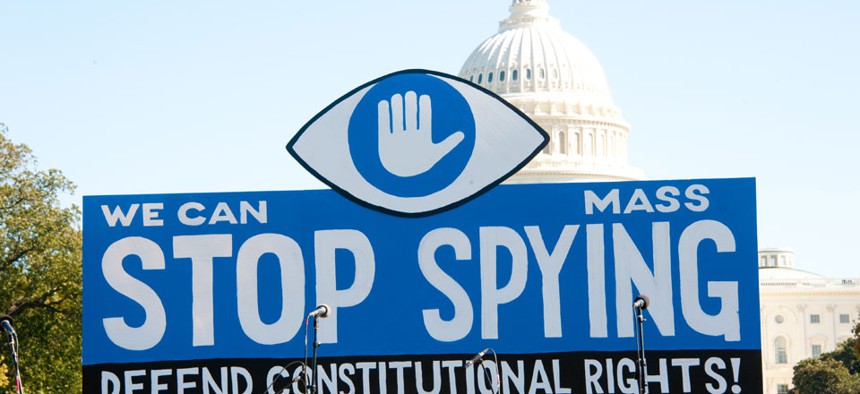
A sign is seen at a protest against the NSA in Washington in 2013. Rena Schild/Shutterstock.com
Independent Federal Agency Says Shut Down Illegal Phone Dragnet
The Privacy and Civil Liberties Oversight Board also noted that the program hasn't stopped any terrorist attacks.
The National Security Agency's practice of collecting and storing data on all phone calls is illegal and should be shut down—that's the conclusion of the Privacy and Civil Liberties Oversight Board, an independent executive-branch agency. Its board members are empowered to investigate and analyze classified material. They're the latest independent voice to cast doubt on various NSA claims.
"In its report, the board lays out what may be the most detailed critique of the government’s once-secret legal theory behind the program," reports Charlie Savage of the New York Times, who obtained an advance copy. He goes on to quote from it:
The program “lacks a viable legal foundation under Section 215, implicates constitutional concerns under the First and Fourth Amendments, raises serious threats to privacy and civil liberties as a policy matter, and has shown only limited value ... the board recommends that the government end the program.”
While a majority of the five-member board embraced that conclusion, two members dissented from the view that the program was illegal. But the panel was united in 10 other recommendations, including deleting raw phone records after three years instead of five and tightening access to search results.
Note that even dissenting members didn't exactly offer a strong defense of the program's legality.
Says the article:
... the other two members—Rachel L. Brand and Elisebeth Collins Cook, both of whom were Justice Department lawyers in the George W. Bush administration—rejected the finding that the program was illegal. They wrote in separate dissents that the board should have focused exclusively on policy and left legal analysis to the courts. Last month, two Federal District Court judges reached opposite legal conclusions in separate lawsuits challenging the program. Ms. Brand wrote that while the legal question was “difficult,” the government’s legal theory was “at least a reasonable reading, made in good faith by numerous officials in two administrations of different parties.” *
Did the government have a "reasonable reading" of the law?
Let's set aside the issue of whether the phone dragnet violates the Fourth Amendment and ask whether the program is in keeping with Section 215 of the Patriot Act. Representative James Sensenbrenner, one of the Patriot Act's authors, says:
When it was reauthorized in 2006, Congress sought to limit the government’s warrantless access to records. Under the revised law, the government can obtain records if a court determines they are relevant to an authorized investigation into international terrorism or foreign spying.
But in a secret policy decision handed down by a secret court, the government reinterpreted the relevance requirement as an expansion of power rather than a limitation. How can every call that every American makes be relevant? The answer is: They can’t. At a hearing before the House Judiciary Committee, FBI Director Robert Mueller argued that the administration’s request for all foreign and domestic phone records was relevant because the database of all those calls includes relevant information.
This expansive characterization of relevance makes a mockery of the legal standard. According to the administration, everything is relevant provided something is relevant. Congress intended the standard to mean what it says: The records requested must be reasonably believed to be associated with international terrorism or spying. To argue otherwise renders the standard meaningless. **
The government's argument seems un-reasonable to me too. And I confess that I have a hard time believing it was made in good faith. "The program began in late 2001 based on wartime authority claimed by President Bush," the Times reminds us. "In 2006, the Bush administration persuaded the surveillance court to begin authorizing the program based on the Patriot Act under a theory the Obama administration would later embrace." If there's ever a time to suspect bad faith, isn't it when a program begins with no legislative justification, persists that way until it strikes people as lawless, and is only subsequently said to be covered by an existing statute, which is reinterpreted for the purpose?
Come on.
The report addresses whether the dragnet keeps us safe too. The Washington Post's story flags this key quote: "We have not identified a single instance involving a threat to the United States in which the telephone records program made a concrete difference in the outcome of a counterterrorism investigation .... We are aware of no instance in which the program directly contributed to the discovery of a previously unknown terrorist plot or the disruption of a terrorist attack.”
Back to the Times:
... in her dissent, Ms. Cook criticized judging the program’s worth based only on whether it had stopped an attack to date. It also has value as a tool that can allow investigators to “triage” threats and provide “peace of mind” if it uncovers no domestic links to a newly discovered terrorism suspect, she wrote.
Defenders of the dragnet are now reduced to arguing that we should keep spying on the phone calls of virtually every American in part because, when it helps investigators to discover that there are no terrorists here, they will gain "peace of mind." Never mind that millions of us will be creeped out by the invasion of privacy. Peace of mind for the watchers is evidently more important than for the watched.
__
* It is a feature of American common law that the legally dubious behavior of powerful people is transformed into plausibly legal behavior by their good intentions. Regular people are told that ignorance of the law is no excuse for breaking it.
** Sensenbrenner takes on the Obama Administration's dubious legal arguments in greater detail here.
(Image via Rena Schild / Shutterstock.com)







